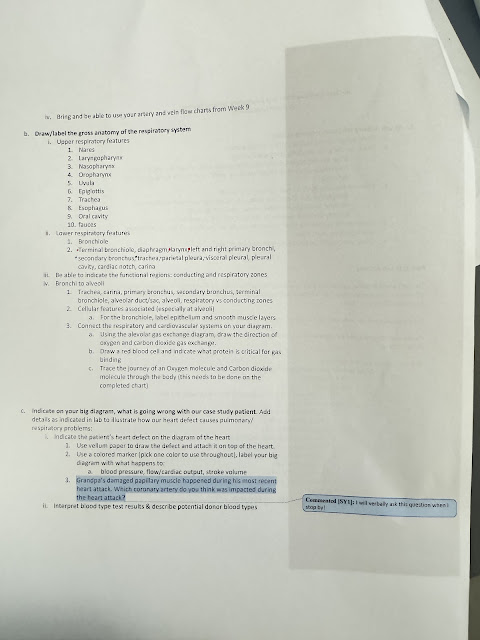simple squamous epithelium that allows for the easy diffusion of oxygen and carbon dioxide.
1. Describe the movement of air through the airways. Be sure to use the following
terms: Primary and secondary bronchi, trachea, mouth, pharynx, larynx, nose,
bronchioles and alveoli, conducting zone, respiratory zone.
2. Describe the structure of an alveoli and how that structure facilitates gas exchange.
Be sure to use the following terms: Type I alveolar cells, type II alveolar cells,
capillaries, elastic fibers.
3. Where do you find the plural membranes? Specifically, where do you find the
parietal pleural membrane? Visceral pleural membrane?
a. What are the two functions of the plural fluid?
- Visceral pleura – touches the lungs directly
- Parietal pleura – touches the rib cage directly in the pleural cavity
b. The pleural membranes anchor the lungs to the side of the thoracic cavity, but
the lungs are elastic. What happens during a pneumothorax that disrupts
these opposing forces?
4. Describe how pressure gradients direct airflow.
a. How does Boyle’s law apply to creating pressure gradients in the lungs?
5. What muscles contract during inspiration?
a. What happens to the volume of the thoracic cavity? What happens to
pressure in the thoracic cavity? What happens to airflow?
6. What muscles contract during passive expiration?
a. What happens to the
volume of the thoracic cavity? What happens to pressure in the thoracic
cavity? What happens to airflow?
7. What muscles contract during active expiration?
a. What happens to the volume of the thoracic cavity? What happens to
pressure in the thoracic cavity? What happens to airflow?
8. Define compliance and elasticity as they relate to the lungs.
a. How does surfactant act to increase compliance of the lung?
What happens to the lungs of premature babies before surfactant is
produced?
b. How does fibrotic lung disease affect
compliance?
c. Explain how emphysema affects the lung tissue. Why does a person with
emphysema have to engage active exhalation all the time?
9. Explain how airway diameter affects airflow to the alveoli.
a. How are diameter & resistance related?
b. How does asthma affect the airways?
10. How is alveolar ventilation affected when the rate of breathing changes?
a. How is alveolar ventilation affected when the depth of breathing changes?
b. How is alveolar ventilation affected when airway diameter changes?
11. How do bronchioles respond to altered CO2 and O2 levels?
12. Using Daltons Law, determine the partial pressure of O2 and CO2 in the atmosphere.
a. Define Henry’s law and describe how it explains how O2 and CO2 move
between the air and the aqueous fluids in the body.
13. Explain how and where O2 exchange occurs. Be sure to identify PO2 levels in the
following places: alveoli, pulmonary arteries, systemic arteries, systemic tissues,
systemic veins, and pulmonary veins.
a. Explain how and where CO2 exchange occurs. Be sure to identify PCO2 levels
in the following places: alveoli, pulmonary arteries, systemic arteries,
systemic tissues, systemic veins, and pulmonary veins.
14. Define hypoxia. Explain why and how high altitude impacts oxygen exchange.
15. How is oxygen is carried from the alveoli to the blood?
16. Describe the structure of hemoglobin.
a. What does it mean Hb is 100% saturated, 75% saturated, 50% saturated,
25% saturated or unsaturated? C. What determines when Hb is “loading” vs.
when it is “unloading”?
17. How is oxygen transported in the blood? (two ways)
18. Draw an oxygen disassociation curve. Identify where loading is taking place and
where unloading is taking place.
a. Using the information in the oxygen disassociation curve, follow one molecule
of Hb from an alveolar capillary through arterial circulation, to an exercising
muscle with a PO2 of 25mmHg, and back to the alveoli. Identify the PO2 levels,
when and where exchange is happening, where loading and unloading is
taking place, and saturation levels of the Hb.
b. Describe the effect of pH on how tightly Hb binds O2.
i. Does a reduction in pH shift the curve to the left or to the right?
c. Describe the effect of temperature on how tightly Hb binds O2.
i. Does an increase in temperature shift the curve to the left or to the
right?
d. Describe the effect of PCO2 on how tightly Hb binds O2.
i. Does it shift the curve to the left or to the right?
19. What are the three ways that CO2 is transported in the blood?
a. How is CO2 converted to bicarbonate?
b. Follow one molecule of CO2 from is source (for example, an exercising
muscle) as it is converted to bicarbonate and then exhaled (as CO2 ) from the
lungs.
20. Describe how the rate and depth of ventilation is controlled. Be sure to use the
following terms: central pattern generator, peripheral chemoreceptors, central
chemoreceptors, inspiratory muscles, and expiratory muscles.
a. Where are central chemoreceptors located and what parameters do they
monitor? How do they regulate the rate and depth of breathing?
b. Where are the peripheral chemoreceptors located and what parameters do
they monitor? How do they work to regulate the rate and depth
of breathing?




